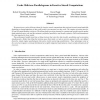Free Online Productivity Tools
i2Speak
i2Symbol
i2OCR
iTex2Img
iWeb2Print
iWeb2Shot
i2Type
iPdf2Split
iPdf2Merge
i2Bopomofo
i2Arabic
i2Style
i2Image
i2PDF
iLatex2Rtf
Sci2ools
ICS
2010
Tsinghua U.
2010
Tsinghua U.
Cache oblivious parallelograms in iterative stencil computations
We present a new cache oblivious scheme for iterative stencil computations that performs beyond system bandwidth limitations as though gigabytes of data could reside in an enormous on-chip cache. We compare execution times for 2D and 3D spatial domains with up to 128 million double precision elements for constant and variable stencils against hand-optimized naive code and the automatic polyhedral parallelizer and locality optimizer PluTo and demonstrate the clear superiority of our results. The performance benefits stem from a tiling structure that caters for data locality, parallelism and vectorization simultaneously. Rather than tiling the iteration space from inside, we take an exterior approach with a pre-defined hierarchy, simple regular parallelogram tiles and a locality preserving parallelization. These advantages come at the cost of an irregular work-load distribution but a tightly integrated load-balancer ensures a high utilization of all resources.
Related Content
| Added | 19 Jul 2010 |
| Updated | 19 Jul 2010 |
| Type | Conference |
| Year | 2010 |
| Where | ICS |
| Authors | Robert Strzodka, Mohammed Shaheen, Dawid Pajak, Hans-Peter Seidel |
Comments (0)

